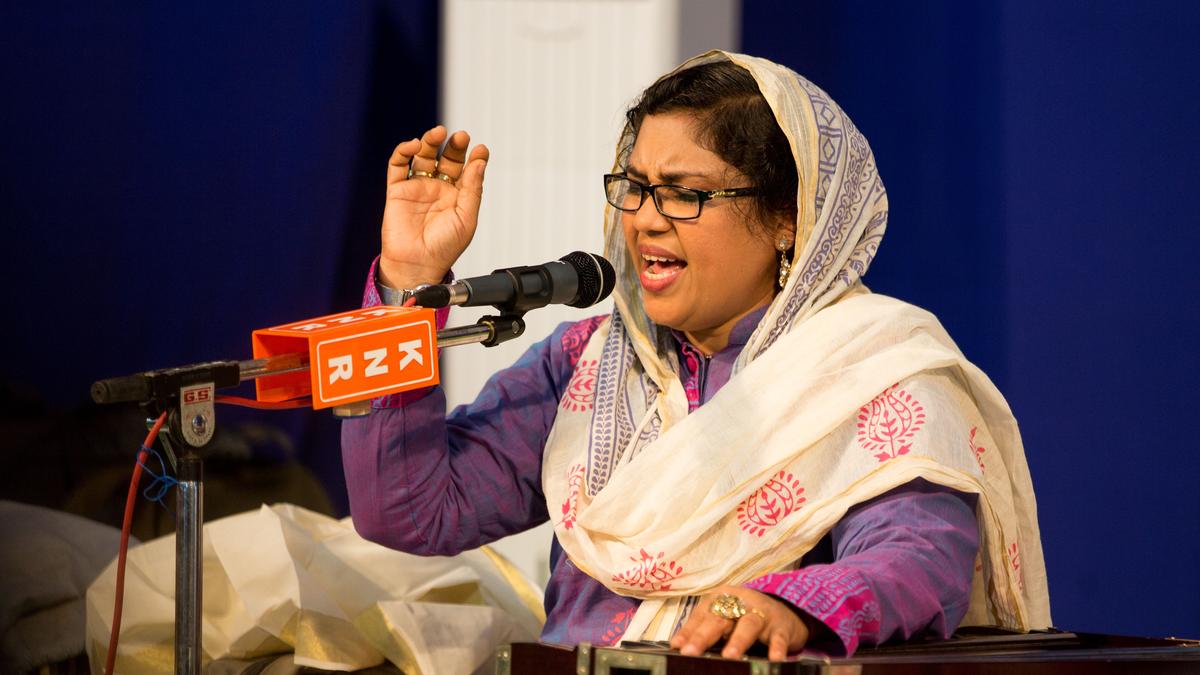She stepped into the male-dominated field of qawwali singing several years ago and continues to enthrall music lovers. Singer-composer Nisa Azizi, 54, is among the recipients of the Kerala Sangeet Natak Akademi Award 2023. Nisa, who grew up in a family of musicians in Malappuram, says she was able to win the award thanks to her father, MA Azeez, who was a Hindustani musician, and her gurus.
“Though there are a lot of female ghazal singers now, female qawwali singers are not common,” Nisa said over the phone from Shornur in Palakkad district.
Nisa started learning Hindustani from AE Vincent at the age of four and performed for the first time with her father at the age of six. Though Hindustani music was all around her, she was admitted to Chembai Memorial Government Music College in Palakkad to learn Carnatic music. “My father and my teacher KG Marar got me admitted to the music college. I was the first girl from the Muslim community to learn Carnatic music there,” says Nisa. She performed at various concerts during the Kalpathi Rath festival and Navaratri festival, including at Thunchanparambu in Tirur, the birthplace of Thunchathu Ezhuthachan, the father of the Malayalam language.
“Many people in our community were unhappy with my decision to learn music. But since my family supported me completely, everything was easy,” says Nisa, who is known as Aziz, the eldest of Aziz’s nine children. Brother In the music world of Malappuram.
While her sisters are not into music professionally, her brothers are full-time musicians. “In all my concerts, one of my brothers accompanies me on the tabla,” she adds.
Ghazal and Qawwali singer and composer Nisa Azizi | Photo Credit: Special Arrangement
Nisa says she couldn’t have had a bigger supporter than her husband Musthafa Desamangalam, who is a director and writer. “He chooses songs that suit my voice.” Their two children are also interested in music.
Nisa has learned Hindustani music from Sharatchandra Marathe and Nalin Mulaj and also studied at Akhil Bharatiya Gandharva Mahavidyalaya Mandal, Mumbai. While working as a teacher at MES Senior Secondary School, Tirur, she continued learning Hindustani music from Ustad Faiyaz Ahmed Khan of the Kirana Gharana, Ustad Rafiq Khan of the Dharwad Gharana and Umar Ustad of the Jaipur Gharana.
The musician says she is highly influenced by the singing skills of legendary Pakistani musician Abida Parveen, known as the queen of Sufi music. “I have a wide-open voice and many people say my singing style is similar to hers,” she says.
Though she sings both qawwali and ghazal in her shows, it is more the qawwali. She says, “Qawwali takes me to a state where I feel connected to a supreme power.” She further added, “There have been many shows where I was surprised how I sang it. The beauty of this genre is that it is not limited to any particular religion.”
She has also been writing ghazals, which she performs in her shows. “I miss Umbai a lot SAAB who popularised ghazals in Malayalam. Now we have an audience that understands ghazals and that is why we have so many ghazal singers in that part of Kerala,” says Nisa. She has released an Urdu ghazal album, jasb-e-dilA Malayalam Ghazal album, Ethra madhuramayi padunnu ni, and a Sufi rock album, Oh Lord.
Rafiq Ahmed, Alankode Leelakrishnan, TP Rajeevan, Sugathakumari, Anwar Ali etc. are among the Malayalam writers whose poems have been composed by Nisa. She also renders compositions of stalwarts like Mehdi Hassan, Nayyara Noor, Noor Jahan, Farida Khanu, Baburaj and so on. Nisa was in the news for rendering lines from Balakandam Ramayana Performed in Sufi style for an online program during the lockdown.
She cannot thank enough the encouragement she receives from the audience, especially from the North Malabar belt. “There have been many occasions when the audience became my backing singers during qawwali sessions. The good thing is that qawwali and ghazals are slowly finding audiences in other parts of Kerala as well,” she says.
Currently, she is busy conducting online classes of Hindustani music for students across the world. “My husband and friends often give me their poems to write down. I love that process – sitting in a room with my harmonium and finding that tune.”
